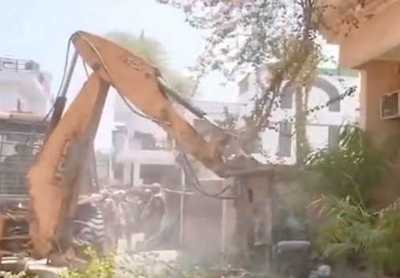"Inhuman and illegal": Supreme Court orders Rs 10 lakh compensation each to 6 illegal demolition victims in Uttar Pradesh


New Delhi: The Supreme Court on Tuesday directed the Prayagraj Development Authority in Uttar Pradesh to compensate six individuals with Rs. 10 lakh each after their homes were illegally demolished and termed the act as “inhuman and illegal.”
A bench of Justice Abhay S. Oka and Justice Ujjal Bhuyan ruled that the demolition was in violation of the right to shelter under Article 21 of the Constitution.
“Authorities must remember that the right to shelter is an integral part of Article 21. Considering the illegal demolition that violated the appellants’ fundamental rights, we direct the Prayagraj Development Authority to pay Rs. 10 lakh compensation to each of them.”
The Court strongly criticised the manner in which notices were served, stating that merely affixing them was inadequate and led to unjust demolition without due process.
Justice Oka remarked, “This shocks our conscience. There is something called the right to shelter, something called due process.”
The Court examined the demolition process and found that a show-cause notice under Section 27 of the U.P. Urban Planning and Development Act, 1973, was issued on December 18, 2020, and affixed on the same day.
The demolition order was passed on January 8, 2021, again affixed but not sent by registered post.
The first registered post communication was only sent on March 1, 2021, received on March 6, 2021, and the demolition was carried out the next day, leaving no time for an appeal.
The Supreme Court emphasised that due process of law should have been followed.
The Court cited Section 43 of the UP Planning Act, which mandates genuine efforts to serve notice in person before resorting to affixture. Justice Oka observed “If a person cannot be found, genuine efforts must be made to serve them in person. The practice of simply affixing notices must stop.”
On March 24, 2025, the Court considered allowing the appellants to rebuild their homes, but they lacked the financial means and sought compensation instead.
The Attorney General of India, R. Venkataramani, opposed this request, arguing that the affected individuals had alternative accommodations. However, the Court rejected this justification.
Justice Oka firmly stated that the compensation is the only way to ensure accountability. “Authorities must always remember to follow due process,” he said.
The Court clarified that its order did not comment on the Appellants’ ownership rights over the land and that they were free to pursue legal remedies to establish their claims.
The petitioners alleged that the State wrongly linked their properties to gangster-politician Atiq Ahmed, who was killed in 2023, and that their homes were demolished without proper notice.
The Uttar Pradesh government argued that the structures were unauthorized and that the occupants had overstayed expired leases.
The Allahabad High Court had previously dismissed the petitioners’ challenge, accepting the State’s argument that their leases had expired in 1996 and freehold applications were rejected in 2015 and 2019.
The Supreme Court directed the Prayagraj Development Authority to strictly follow the guidelines laid down in In Re Directions In The Matter Of Demolition Of Structures, which set legal procedures for serving notices and carrying out demolitions.
The Apex Court said that its order will send a strong message against unlawful demolitions and emphasized the importance of due process in upholding fundamental rights.

